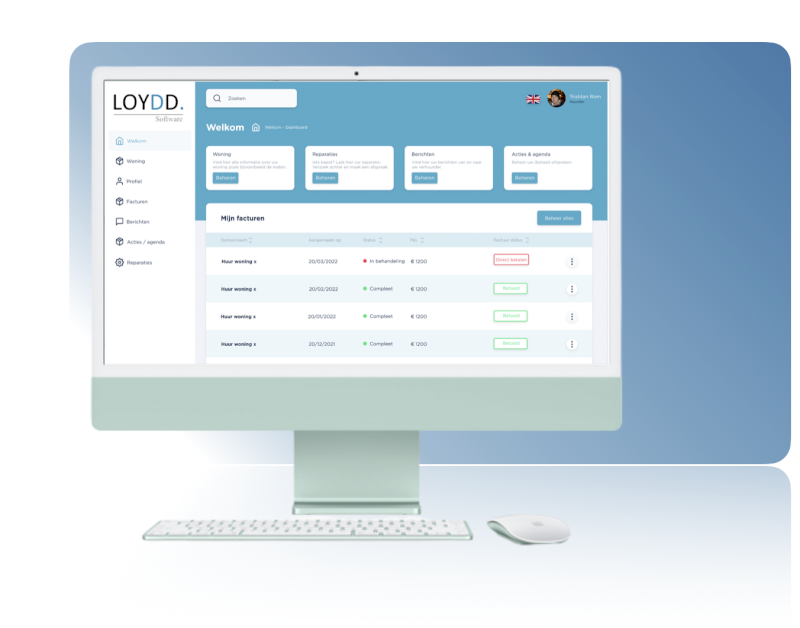A bailiff at the door, when is the time?
You're several months behind on your rent, you've already received several reminder emails from your landlord. And at some point a collection agency is called in. Just what is the difference between a collection agency and a bailiff? And when does it get to the point where a bailiff actually shows up on your doorstep?
What is the difference between a bailiff and a collection agency?
Collection agencies and bailiffs, make sure that those who are still getting money (the creditors) get their money to which they are entitled from the person in arrears (the debtors).
A collection agency, unlike a bailiff, has no authority to legally force debtors to pay. They may only issue requests. Therefore, collection agencies mail and call several times a week/day to make sure payments are made. A collection agency may seem more approachable, which is why debtors are often less impressed with it.
A bailiff is much more decisive, they often write only two letters, call once and then immediately start legal proceedings. If the debtor refuses to pay, the bailiff, may seize his assets, income or movable and immovable property. This may be done against the person's will if necessary. In this way, the amount still owed can still be paid. The bailiff is also the only person in the Netherlands allowed to do this. By means of this seizure the money can be collected to which the creditor is entitled. The bailiff may actually issue a so-called "order" for a payment, these far-reaching powers come through the Bailiffs Act.
The debt settlement process
If you have rent arrears as a tenant, this is annoying for your landlord. These are often difficult situations, where the landlord wants his money and the tenant may be in trouble. In some situations, this may well lead to termination of the lease. You can possibly read more about this in one of our other blogs "dealing with a difficult tenant. But apart from terminating the lease, a collection agency can of course be called in.
The collection process consists of two stages, the pre-court stage and the post-court stage. The first phase consists of sending reminders by mail or e-mail to the person who has yet to pay or is in debt. After the verdict, phase two begins and involves legal coercive measures, which only a bailiff has the authority for.
Bailiffs call the debtor once and often send two letters. Then, if the debtor does not pay, they start legal proceedings on behalf of the creditor. Then the debtor gets a chance to tell his or her story to the judge, and then the judge makes a ruling. Finally, only the bailiff can start collecting the amount owed. Collection agencies do not have that authority.
What should I do if a bailiff is actually at the door?
If you are faced with a bailiff and you are unsure if it is really a bailiff, you can ask for identification. Also, if you get a letter or mail from a bailiff, you can check on the website. If someone cannot be found on this site or has a foreign bank account number, you can contact the Royal Association of Bailiffs (KBvG).
Should the bailiff rightly show up at your doorstep try to cooperate. Listen carefully to what he or she has to say. Of course, you can always ask for additional explanation. The decision to involve a bailiff does not come out of the blue. Don't resist or hide, it will only bring more misery. Eventually the bailiff will come back with a locksmith or even a police officer. Therefore, always try to pay on time, request a payment plan or seek debt counseling to avoid these situations. Also notify your landlord in time if you are in trouble and seek contact with family or friends so that they can guide you through this situation.
Summary
The difference between a collection agency, unlike a bailiff, has no legal authority to force debtors to make payments. After a number of dunning notices, they usually turn to a bailiff. A bailiff then tries to contact the debtor once or twice more and then starts legal proceedings. If the debtor ultimately still fails to pay, the bailiff may seize assets, income or movable and immovable property. So always make sure you pay your rent on time or get in touch with your landlord on time. This will prevent many unnecessary unpleasant consequences.

Consultation
If you would like to know what Loydd Software can do for your business, our consultants would be happy to visit you for a no-obligation consultation. Please fill in your details below. We will contact you as soon as possible.


